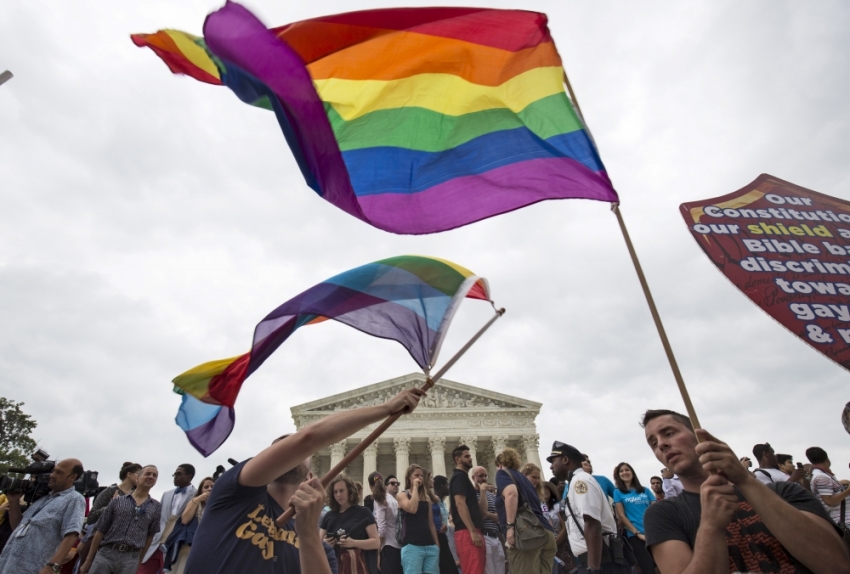Democrat-led House passes bill to codify same-sex marriage, redefine institution

Members of the Democratic-led House who are fearful that the U.S. Supreme Court might one day overturn the Obergefell v. Hodges decision that legalized same-sex marriage nationwide passed legislation Tuesday that seeks to codify same-sex marriage into law.
Forty-seven Republicans joined all House Democrats in passing the measure by a vote of 267-157. The bill now moves to the Senate where it’s expected to fail because at least 10 Republicans would need to join Democrats to pass the legislation for it to be signed into law by President Joe Biden.
Rep. David Cicilline, D-R.I., announced in a statement Monday that he and several other House members had introduced the “Respect for Marriage Act.” The legislation would also “repeal the Defense of Marriage Act” (DOMA), which defines marriage as a union between one man and one woman.
While Obergefell and an earlier Supreme Court decision, United States v. Windsor, struck down DOMA as unconstitutional, supporters of the Respect for Marriage Act are attempting to codify same-sex marriage into law.The push for the codification of the 2015 court decision follows the June 24 Dobbs v. Jackson Women’s Health Organization ruling that overturned the Roe v. Wade decision that legalized abortion nationwide.
In a concurring opinion in Dobbs, Justice Clarence Thomas chastised the idea of substantive due process as “legal fiction.” Noting that the doctrine of substantive due process was used to insist that the Constitution contained a right to abortion, he suggested that the Supreme Court should “reconsider all of this Court’s substantive due process precedents,” including Obergefell.
However, Thomas agreed with the majority opinion in Dobbs that “[n]othing in [the court’s] opinion should be understood to cast doubt on precedents that do not concern abortion.” Additionally, although he characterized Obergefell and other cases involving substantive due process as “demonstrably erroneous,” Thomas indicated an openness to determining “whether other constitutional provisions guarantee the myriad rights that our substantive due process cases have generated,” including same-sex marriage.
While expressing support for same-sex marriage, the bill's lead sponsors pointed to Thomas’ concurring opinion as the justification for passing the legislation. Rep. Jerry Nadler, D-N.Y., the bill's sponsor, lamented that “three weeks ago, a conservative majority on the Supreme Court not only repealed Roe v. Wade and walked back 50 years of precedent, it signaled that other rights, like the right to same-sex marriage, are next on the chopping block.”
“As this court may take aim at other fundamental rights, we cannot sit idly by as the hard-earned gains of the equality movement are systematically eroded. If Justice Thomas’ concurrence teaches anything it’s that we cannot let your guard down or the rights and freedoms that we have come to cherish will vanish into a cloud of radical ideology and dubious legal reasoning,” he added.
Nadler described the legislation as “an important step toward protecting the many families and children who rely on the rights and privileges underpinned by the constitutional guarantee of marriage equality.” He cited the bill as necessary to “provide stability and certainty for these children and families.”
The Respect for Marriage Act garnered 160 co-sponsors in the House, all Democrats. One Senate Republican, Susan Collins of Maine, has emerged as a leading supporter of companion legislation in the Senate.
In the event that the Supreme Court does overturn Obergefell, each state would have the authority to decide whether to issue marriage licenses to same-sex couples. The Respect for Marriage Act declares it illegal for any state to deny “full faith and credit to any public act, record, or judicial proceeding of any other State pertaining to a marriage between 2 individuals, on the basis of the sex, race, ethnicity, or national origin of those individuals.” In other words, all states must recognize same-sex marriages as valid.
Critics of the Respect for Marriage Act, including Terry Schilling of the conservative advocacy organization American Principles Project, have warned that the legislation will negatively impact religious liberty in the U.S., much like the Obergefell decision did: “The consequences of the court’s redefining of marriage have been extensive, affecting nearly every American. Many have seen their First Amendment rights threatened or curtailed, such as bakers, florists, photographers and others.”
“Parents have been shocked to discover lessons on sexual orientation injected into their young children’s schools and smuggled into the TV shows they watch and the books they read. In many workplaces, one cannot even quietly oppose the ideology of ‘Pride’ without risking one’s career,” Schilling maintained. “While many Americans assumed the good faith of the LGBT movement those years ago, we should know better now.”
Schilling warned that “to give in on this issue would mean surrendering to ideologues who wish to stamp out the traditional family and punish all of us who still hold to this ideal.” He urged “every Republican who truly cares about marriage and the family to vote against this legislation,” vowing that “conservatives, and especially parents, will be watching to see who our true allies are.”
The push to codify Obergefell into law follows the House’s passage of the so-called "Women’s Health Protection Act" last week. The legislation, which the House approved before the Dobbs decision, would codify the right to abortion into federal law and limit the ability of states to pass pro-life laws.
In the most recent vote, which took place Friday, the Women’s Health Protection Act received the support of 219 members of Congress, while 210 opposed it. All but one Democrat, Rep. Henry Cuellar of Texas, voted in favor of the legislation and it received no support from House Republicans. The bill is expected to fail to achieve the necessary votes for passage in the evenly divided Senate, as it did in both February and May of this year.
Public opinion polling reveals strong support for same-sex marriage nationwide. Data collected in 2021 from the Public Religion Research Institute revealed that 68% of Americans support same-sex marriage compared to 30% who oppose it. Same-sex marriage has achieved majority support in most states, while majorities of residents in only two states, Arkansas (52%) and Mississippi (55%), oppose it.
Before the Windsor and Obergefell decisions, voters in 30 states had approved constitutional amendments banning same-sex marriage, according to Pew Research Center. A 2006 effort to add a ban on same-sex marriage to the U.S. Constitution failed to achieve the necessary votes for passage.
At the same time, voters in three states had voted to legalize same-sex marriage at the ballot box in 2012, while Minnesota voters rejected a ballot measure seeking to ban same-sex marriage in the state constitution. A handful of other states had legalized same-sex marriage via state legislative action or a state court decision while the remaining states either had statutory bans on same-sex marriage or laws that did not explicitly ban or legalize it.
Ryan Foley is a reporter for The Christian Post. He can be reached at: ryan.foley@christianpost.com



























